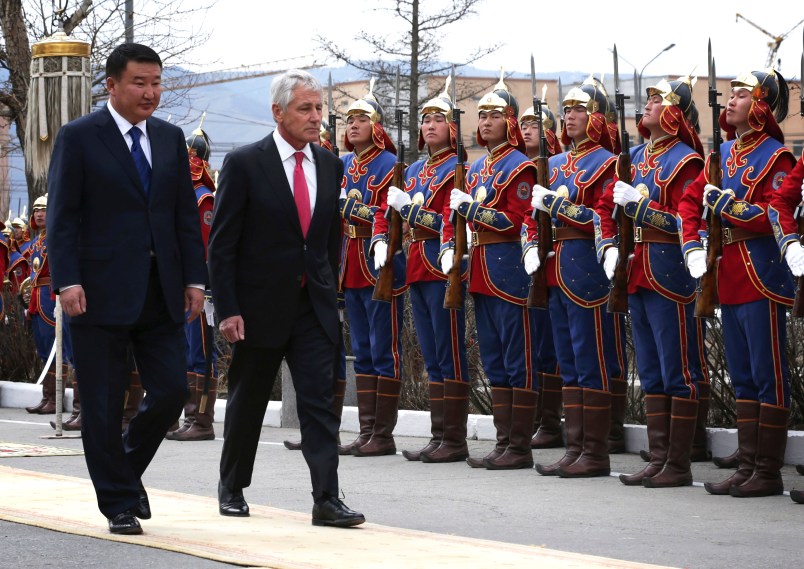ULAN BATOR, Mongolia (AP) — After days of high-profile, pressure-filled meetings, Defense Secretary Chuck Hagel got to horse around a bit during a short stop in Mongolia on Thursday.
Following a time-honored tradition, Mongolian Defense Minister Bat-Erdene Dashdemberel presented Hagel with a buckskin-colored horse in a ceremony in front of that country’s defense ministry. Hagel, who was wrapping up a 10-day trip to the Asia-Pacific region, named the horse Shamrock.
Tradition dictates the 9-year-old gelding be named after something of importance to the recipient, Hagel said. “Shamrock was the mascot of the high school that I graduated from, St. Bonaventure in Columbus, Neb.,” he said. “It was one of the most important times of my life.”
Shamrock will stay in Mongolia, where he has been serving in the cavalry’s honor guard battalion. No one will ever ride the horse but Hagel, officials said.
“Now you be good while I’m gone,” Hagel said as he patted the stocky horse.
Hagel is the second defense secretary in recent years to receive one of the Mongolian horses, which are bred for endurance. Then-Pentagon chief Donald Rumsfeld also got one when he visited Mongolia in October 2005. He named it Montana because the arid, mountainous landscape around the Mongolian capital reminded him of that state.
The gift to Hagel reflected the congenial tone of the day, as the secretary and Bat-Erdene signed an agreement that calls for expanding U.S. military training and exercises with Mongolia. The agreement signed by Hagel noted that Mongolia “serves as a stabilizing influence in Asia and is seeking to modernize its military in a transparent fashion.”
Landlocked with 2.8 million people spread over an area twice the size of Texas, Mongolia is dwarfed by China, but also relies on the Asian nation for much of its economy. It has worked to maintain its independence from Beijing and Moscow by increasing its ties to other world powers, including the U.S. and Japan.
Mongolian troops have been a visible and frequent force in Iraq and Afghanistan, often providing security at U.S. facilities. There are about 10,000 active duty Mongolian troops, and to date 9,500 have served in Iraq, Afghanistan or another peacekeeping mission around the world.
All the commanders who led Mongolian troops during the Iraq and Afghanistan deployments went through U.S. training programs, the Pentagon said. The U.S. provides about $2 million in foreign military sales annually to Mongolia, and another $1 million in military education and training.
The Mongolia stop was brief and friendly as the two defense chiefs talked about how they want to improve Mongolia’s peacekeeping efforts and its military’s medical services. Hagel’s meetings in China, however, were often sharper and controversy-tinged.
The U.S. has criticized Beijing’s recent declaration of an air defense zone over a large swath of the East China Sea, including disputed remote islands controlled by Japan but claimed by China. Hagel and the Chinese leaders have delivered sharp exchanges on those issues, as well as Washington’s continued close ties with Taiwan, at meetings and public events.
Beijing leaders meanwhile have asserted their right to protect and regain their territories using diplomacy and military action if necessary. And they have questioned U.S. claims that it remains neutral on the sovereignty of the disputed islands. The U.S. has also committed to protect Japan, which is a treaty ally.
On Wednesday, Hagel met with China President Xi Jinping in a session U.S. administration officials described as more positive than some of the sharper meetings earlier in the week with the defense minister and others.
At the start of the meeting, Xi, speaking through a translator, said Hagel’s visit “will definitely push forward the development of our new model of military-to-military relationship.”
Senior U.S. officials said the ongoing tensions with North Korea, including Pyongyang’s threats to conduct additional missile launches and a nuclear test, were a key topic during the meeting.
Hagel stressed that China and the U.S. must work together, and both agreed that the denuclearization of the Korean peninsula was a priority, said the officials, who were not authorized to talk publicly about the private session so spoke on condition of anonymity.
Copyright 2014 The Associated Press. All rights reserved. This material may not be published, broadcast, rewritten or redistributed.






